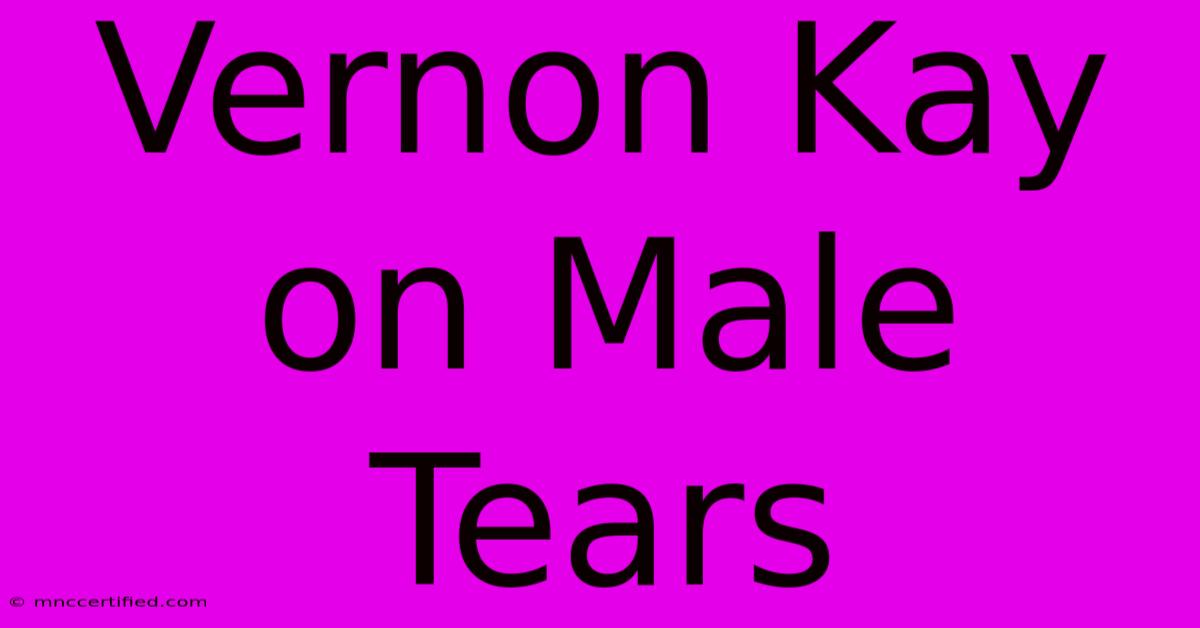Vernon Kay On Male Tears

Table of Contents
Vernon Kay on Male Tears: A Shifting Cultural Landscape
Vernon Kay, a familiar face on British television, recently opened up about his own experiences with expressing emotion, specifically shedding tears. This seemingly simple act has sparked a wider conversation about masculinity, societal expectations, and the evolving understanding of male emotional expression. This article delves into Kay's comments, the broader context of male tears, and the implications for a healthier, more empathetic society.
The Vernon Kay Interview: A Catalyst for Change?
While the specifics of the interview may vary depending on the source, the core message remains consistent: Vernon Kay has acknowledged and discussed his own instances of crying. This seemingly small act holds significant weight, challenging the traditionally stoic image often associated with masculinity. For many men, publicly admitting to crying can feel vulnerable, a fear reinforced by societal pressures to suppress emotions. Kay's willingness to share his personal experience can help normalize male tears and encourage other men to feel comfortable expressing their emotions.
Breaking Down Barriers: Why this Matters
The significance of Vernon Kay's comments lies in its potential to break down harmful stereotypes. For too long, society has conditioned men to believe that showing emotion, particularly sadness or vulnerability, is a sign of weakness. This pressure to conform to a rigid definition of masculinity can have detrimental effects on mental health, leading to issues such as anxiety, depression, and a reluctance to seek help.
- Challenging the "Strong Silent Type": The outdated ideal of the "strong silent type" actively discourages emotional expression. This article advocates for a more nuanced understanding of masculinity that embraces vulnerability as a strength, not a weakness.
- Normalizing Emotional Expression: Vernon Kay's openness helps normalize a natural human response – crying. By openly discussing his experiences, he provides a powerful example for other men to follow.
- Improving Mental Health Outcomes: Openly discussing emotions and seeking support are crucial for good mental health. Kay's comments contribute to a conversation that can encourage men to seek help when needed.
The Broader Context: Male Tears and Society
Vernon Kay's discussion forms part of a larger societal shift regarding male emotions. Increasingly, there's a growing recognition of the importance of emotional intelligence and the detrimental effects of suppressing feelings.
Societal Expectations and Their Impact
The societal pressure on men to suppress their emotions has deep roots, stemming from traditional gender roles and expectations. However, this pressure is increasingly being challenged as more men speak out and advocate for a more emotionally intelligent approach to masculinity.
The Role of Media and Representation
Media representation plays a significant role in shaping societal perceptions. While progress is being made, there's still a need for more diverse and authentic portrayals of masculinity in film, television, and advertising. Showing men expressing a full range of emotions will help normalize such behavior for future generations.
Moving Forward: Embracing Emotional Intelligence
Vernon Kay's comments serve as a reminder that emotional expression is a sign of strength, not weakness. By embracing vulnerability and fostering open communication, we can create a more supportive and understanding society for all.
Encouraging Open Conversations: Practical Steps
- Start with yourself: Reflect on your own emotional responses and consider how you express them.
- Challenge societal norms: Actively challenge gender stereotypes and promote healthy emotional expression.
- Seek support: Don't hesitate to seek professional help if you are struggling with emotional issues.
- Lead by example: Be a role model for others by openly expressing your emotions in a healthy way.
Vernon Kay's willingness to discuss his experience with crying is a significant step towards a more empathetic and understanding society. By embracing emotional intelligence and challenging traditional notions of masculinity, we can create a world where all individuals feel comfortable expressing their full range of emotions. This article aims to contribute to that crucial conversation.

Thank you for visiting our website wich cover about Vernon Kay On Male Tears. We hope the information provided has been useful to you. Feel free to contact us if you have any questions or need further assistance. See you next time and dont miss to bookmark.
Featured Posts
-
Says The Guy With No Car Insurance
Nov 16, 2024
-
Uefa Denmark Spain Live Stream 11 15 24
Nov 16, 2024
-
Insurance Defense Attorney Near Me
Nov 16, 2024
-
Girls Alouds New Single I Ll Stand By You
Nov 16, 2024
-
Kennedy Jrs 5 Key Health Policies
Nov 16, 2024